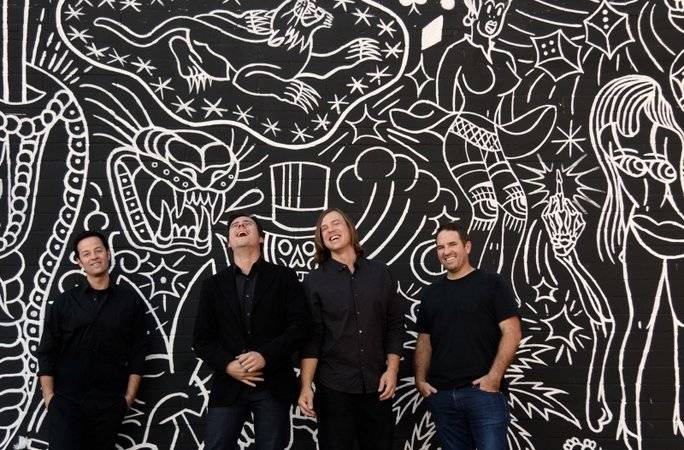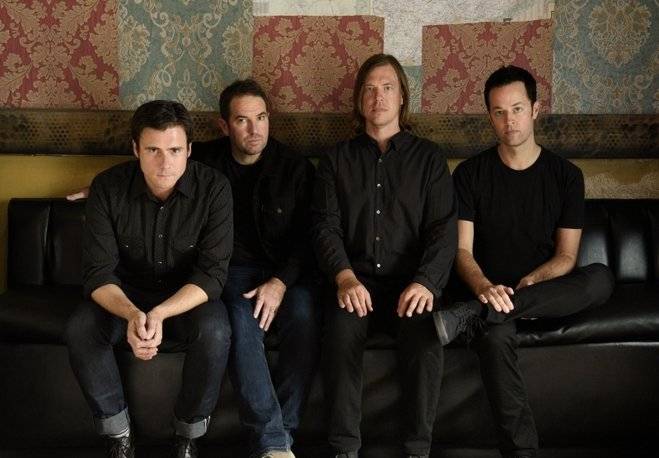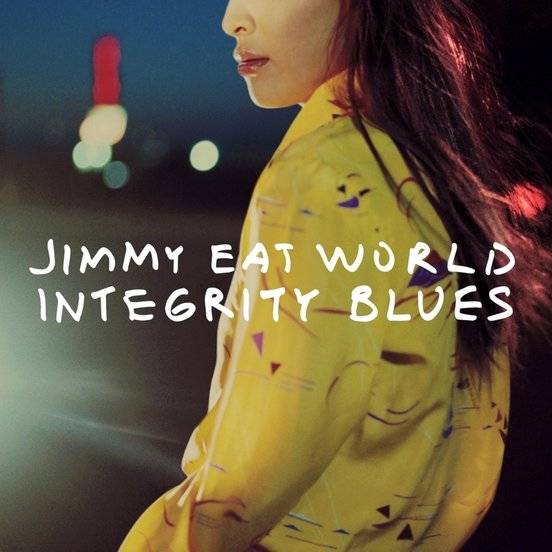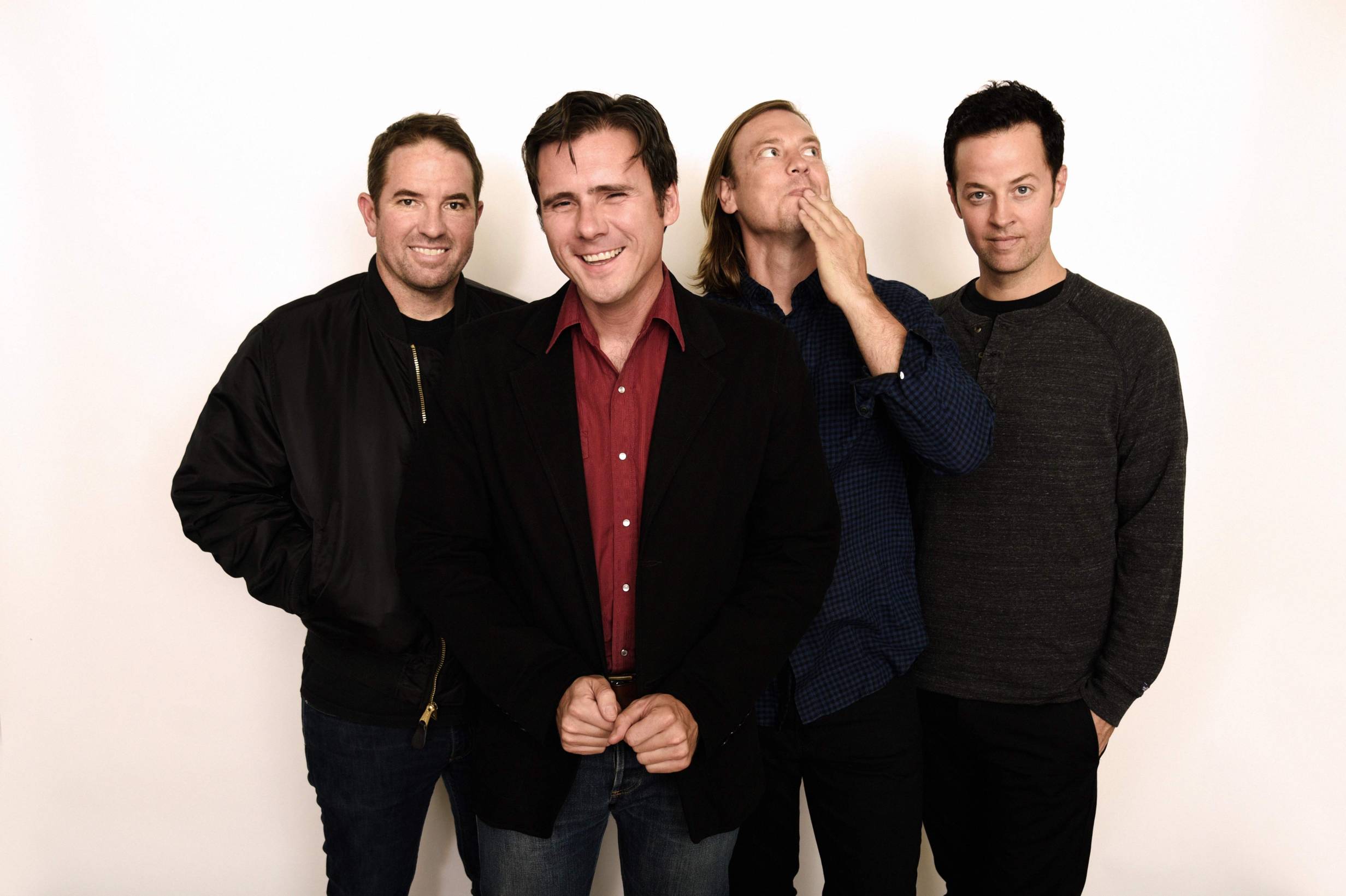Jimmy Eat World dropped Integrity Blues last October, and it’s a solid release, well within the band’s emo/powerpop bailiwick. One of the virtues of Jimmy Eat World, in my book, is that their songs can range pretty greatly, but remain so identifiably “Jimmy Eat World.” I can remember seeing the video for “The Middle” on MTV2 after school, when I was a freshman or sophomore in high school. I distinctly recall that my initial impression was, “This is vanilla.” The straight 2&4&2&4&2&4 drum beat, in particular, was anathemic to my 14-year-old mind. A waste of an opportunity to do something weirder. But in music, as in life, simplicity can be a virtue, and “The Middle” wore away at me, as most songs on MTV2’s repetitive video cycle did, and before long I found myself connecting with the chords, the melodies, the vocals, and the lyrics. I’m glad I didn’t write them off then and there, because that album – 2001’s Bleed American – is great. “A Praise Chorus,” and “The Sweetness,” and “Get it Faster”… pretty much front to back, it’s a great album.
A lot of those same sounds, particularly vocal sounds, remain undeniably at the forefront of each of their albums. Futures was maybe a bit darker. Integrity Blues, in particular, could easily be the immediate follow-up to Bleed American or Futures, despite the 15 years that passed since Bleed American, and the 12 that passed since Futures. I think that’s a good thing.
Rick Burch has been playing bass for Jimmy Eat World for over twenty years, and his driving bass lines are an integral part of the band’s sound. In advance of the band’s May 6th show at The Canopy Club, I asked Rick to walk me through the band’s musical process, what they have been up to lately, and to look back at the band’s growth.

Smile Politely: How is everything going with Integrity Blues?
Rick Burch: Thanks for asking. Integrity Blues is going great. It’s a really special album to us. We really challenged ourselves. Working with Justin [Meldal-Johnsen] was great, and we are really happy that people are really digging the tunes. The live response has been incredible.
SP: What makes it such a special album to you guys?
Burch: Just the way it came together. We took a year off, which we had never done before. It was great. When you’re so close, amidst something for so long, like we were, [for,] you know – twenty plus years, every day you wake up, like, “Jimmy Eat World. What’s happening today?” You’re deep in it. So when we took that year to step back, it was kind of weird at first. It took a minute to get used to, but it was great. All of us kind of did things other than Jimmy Eat World. After that year, we knew what we loved about it, and we knew what we missed about it. It just kind of re-lit the fire. Not that it was really out, we just got some perspective.
SP: So what did you do with your year off?
Burch: During my year off, I set up a distilling company, Caskwerks Distilling Company.
SP: Oh, wow. What are you making?
Burch: [laughs] I love distilling whiskey, but we haven’t gotten that program running yet. We have been making lots of other stuff, specifically gin, which I find exciting – working with botanicals, and creating a flavor profile from that. I think we’ve got a couple unique recipes that are good. We also make liqueurs – you know, sweetened spirits. We make an “Apple Pie,” basically a liquid apple pie that is 25% alcohol. We just started making some vodka. We are having a lot of fun with it! Only in Arizona right now, but hopefully beyond our state soon.

SP: So tell me more about Integrity Blues. Any tracks in particular that you’ve been excited to play?
Burch: I love playing “Pass the Baby.” It’s really fun to play. It’s a nice journey… kind of [laughs]. It’s something that we haven’t really explored enough of: some riff rockage.
SP: Oh yeah. “Pass the Baby” gets pretty gnarly at the end.
Burch: Oh yeah. It’s great to see the audience reaction. It’s pretty rad. It’s an audio experience.
SP: Yeah, it starts off slow, and then cuts loose. What is your approach to writing?
Burch: Mainly just working with the drums. Just working together to create a solid rhythm foundation for the other guys to go off on top of.
SP: What’s the process like for the whole band?
Burch: There’s no individual way. We don’t have a formula or anything. Ideas happen, and they happen in all sorts of ways. Jim’s got a massive notebook of lyric ideas. We’re all having musical ideas all the time, so generally, we’ll just compile a notebook, and it’s always being added to. Then we’ll go back when we have time in the studio, and we go through that notebook. Things that excite us right then, listening back to them, it could be a really old idea. It could be eight years old. “Pass the Baby,” for example, has been around for a good number of years. Jim had the concept of this thing that goes to different places, and never goes back to where it was before. We had a few approaches to it, but we never really felt like it was “it,” but this time around, we made it happen. So the ideas can be around, getting chipped away at for a really long time. Or, you know, songs like “The Middle” came together really quickly. Literally in a number of days.
SP: Ah. “The Middle” strikes me as being your first “break out” track, so to speak. Do you recall how it came together? Can you put yourself back in that time?
Burch: Yeah, that came together during Bleed American. I think we were already in the studio, working with Mark [Trombino], over there in North Hollywood. It came together in that session, where mostly everything else was already done. “Done” in terms of like, pre-production. We had really mapped out what we were going to do while we were in the studio, because we didn’t have a lot of money, so you have to maximize your time when you are paying by the hour. So we spent a lot of time preparing, so that when we ARE in there, it’s like a checklist. Move through it.
SP: Do you know when you’ve got a single? Could you tell then, that “The Middle” was going to be big?
Burch: No idea. Of course we have songs that we like, that we personally feel great about, but you never know what popular culture is going to embrace, and it’s healthy to not try to predict that. So we just try to do what makes us happy, and excites us right then, when listening back to it, and hopefully other people like it like we do.

SP: So what’s in store for the tour?
Burch: North America on this one. It’s about a month long, total, with a band called Beach Slang. It’s a good gig, I’m really looking forward to it. I know the days are going to be a lot of fun. After this month around, we’ll likely continue touring for the rest of the year. There’s a trip to Japan planned, Europe a couple times, back to North America again, so: traveling and playing music. It’s great.
SP: Oh nice! Beach Slang is signed to Polyvinyl, which is based in Champaign. They’re a great band. Have you listened to their catalog much?
Burch: Killer. Yeah, it’s great.
SP: So you guys have been at this for over twenty years now. When did you know this was going to be something that you could be doing for a long time?
Burch: Oh, hmm. It was when Bleed American started gaining some steam. It was the summer of 2001. The song “Bleed American” was gaining momentum on alternative radio. So our gauge of it, because we were on tour, was just that more and more people were coming to the gigs. When you’re on the road, sometimes you’re in a little bubble for some things. That’s just your world and what you’re focusing on, and that’s what you’re doing. But the shows started getting bigger and bigger, and we were selling more and more records, so it was then that we realized, “Wow, this is something that’s gaining momentum. This is really cool.” It was kind of then that I was able to quit my day job, and not go back to work when we got off tour.
SP: What were you doing at the time?
Burch: At the time, I was at Trader Joe’s. Shopping carts and frozen hams! [laughs]. Awesome company, though.
SP: Nice! A solid, steady job. You guys seem to do a really great job of not producing the same thing, but at the same time, your songs have a distinct “Jimmy Eat World” quality to them. How do you stay true to the core of your sound, but keep evolving at the same time?
Burch: We just do things that excite us, so that’s our taste. So maybe that is sort of the unifying agent throughout, that’s just sort of like, “Okay, that’s the Jimmy Eat World thread.” Challenging yourself, that’s totally up to you. That’s being aware of when you are comfortable, and realizing that you need to make yourself not comfortable. [Laughs] That’s hard to do! That’s what we all want to be: comfortable.
SP: So what do you do when you hit a spot where you are comfortable? When you go, “Okay, we’ve done this before.”
Burch: Just think of it from a different angle. Try to mix it up somehow. Different instrumentation. Anything but what was making you comfortable. Anything but that, and it’s going to be different.
SP: Well, Rick, I really appreciate you taking the time to talk to me and Smile Politely. We appreciate getting the opportunity to talk to you and pick your brain a little bit.
Burch: Absolutely, it’s been my pleasure. Thanks for having me.
Jimmy Eat World are performing at the Canopy Club Saturday, May 6th, with Beach Slang. Doors open at 8 p.m. Tickets are $30 in advance and $35 at the door.
All photographs by Jimi Giannatti, reproduced courtesy of “Big Hassle” Publicity.








